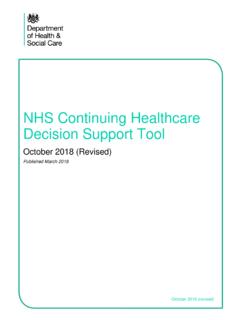Transcription of Guide to Psychiatric Crisis and Civil Commitment Process ...
1 Guide to Psychiatric Crisis and Civil Commitment Process in Virginia Guide to Psychiatric Crisis and Civil Commitment Process in Virginia The contents of this short Guide describe the steps you can take to help a friend or family member who is experiencing a Psychiatric Crisis and in need of help, primarily focusing on the Civil Commitment Process in Virginia. A Psychiatric Crisis can include, but is not limited to: suicidal or homicidal thinking and/or behavior, acute psychotic symptoms, increased drug or alcohol use, and sudden changes in mental status. The steps described in this Guide progress from a person who is cooperative and voluntarily seeking help, to someone who is not seeking help on his or her own and may require mental health assistance via the Civil Commitment Process .
2 Please keep in mind that a Psychiatric Crisis and the Commitment Process in particular can be traumatic experiences for the individual. It is recommended to always encourage the individual to receive treatment voluntarily, as it will result in a better outcome for all involved. However, we know that at times seeking help through the Commitment Process is the safest course of action for the individual and his/her loved ones. The legal age of consent for hospitalization is 14 in Virginia. This means that if the individual is a minor between the ages of 14 and 18, he or she has the legal ability to voluntarily receive services, with or without parent consent, and will be asked to sign a consent form during the facility s intake Process .
3 However, if the individual is younger than 14 years old, the processes of evaluation, admission and treatment are at the sole discretion of the parent(s)/guardian(s). Important Terms Defined Commitment Hearing a court Process involving a special justice who hears evidence, and decides whether the person under consideration meets the criteria for involuntary Commitment , and ultimately delivers the decision and plan that will be carried out by the CSB/BHA or other mental health care provider. Community Services Board (CSB)/Behavioral Health Authority (BHA) Virginia s publicly funded system of services for mental health, intellectual disability, and substance abuse.
4 CSB/BHAs provide pre admission screening and Crisis services 24 hours per day, 7 days per week. Contact information is online and at the end of this Guide . Emergency Custody Order (ECO) a legal order by the court authorizing the law enforcement agency to take a person into custody for a mental health evaluation performed by a qualified mental health clinician through the local CSB/BHA. Updated April 2016 1 Temporary Detention Order (TDO) a legal document requiring an individual to receive immediate hospitalization for further evaluation and stabilization, on an involuntary basis, until a Commitment hearing can be arranged to determine their future treatment needs.
5 Magistrate a local, independent judicial officer who presides over hearings for minor criminal complaints and Civil Commitment cases. The magistrate is typically a lawyer. Person/Individual under consideration the individual who is in Crisis , the subject of the ECO, TDO, and/or Commitment hearing. Petitioner the individual who files or requests the ECO/TDO this may also be the person under consideration, or a third party, such as a concerned family member, friend, neighbor, etc. Psychiatric Crisis can include, but not limited to: suicidal or homicidal thinking and/or behavior, acute psychotic symptoms, increased drug/alcohol use, and sudden changes in mental status.
6 Special Justice the official who hears evidence during the Commitment hearing, and decides whether the person under consideration meets the criteria for involuntary Commitment , and delivers the decision and plan to be carried out by the CSB/BHA or other mental health care provider. My loved one/friend/neighbor is in a Psychiatric Crisis and is cooperative, aware of his/her mental state, and interested in getting help from a mental health professional. What should I do? There are many options in these situations. If the person already has an established relationship with a mental health service provider such as a psychiatrist, therapist, case manager, or other mental health worker, encourage your loved one/friend/neighbor to contact him or her for professional assistance in determining appropriate action.
7 You can also ask the person you are concerned about if he/she has a Wellness Recovery Action Plan (WRAP), advance directive, or other written information on preferred treatment and support routine during a period of Crisis . If she or he does, you should attempt to obtain and follow this, and work with the person to work through the plan. If your loved one/friend/neighbor does not have a relationship with a mental health professional, then make every effort to identify a professional who is able to see your loved one/friend/neighbor right away. You can offer to help your friend or loved one set up the appointment.
8 Offer to go with him or her to serve as a support system. Ways to locate professionals include contacting the phone number on the back of the person s insurance card and then asking for names and phone numbers of mental health professionals (such as a psychiatrist, clinical social worker, etc.) in the area where the person you are concerned about lives. 2 If the person you are concerned about does not have insurance, contact the closest community services board and ask for an immediate appointment for someone in a mental health Crisis . Community services boards are local agencies that are mandated by the state to provide emergency mental health services and will assist you in locating available services.
9 A list of CSB/BHA contacts is provided at the end of this Guide . Other possible suggestions include the emergency room, a mental health clinic, a walk in Crisis center, Crisis stabilization unit, a mobile Crisis intervention unit, Crisis mobilization team, or a Psychiatric hospital. My loved one/friend/neighbor is in a Psychiatric Crisis and is refusing to voluntarily seek help. I am really worried about him/her and think the situation might become dire very soon. What should I do? If you feel that there is an immediate need for help and that your loved one is in immediate danger of hurting him or herself (or someone else), call 911.
10 A police officer will come and provide an initial assessment of the situation. The police officer s job is to ensure the safety of the individual and others involved. When you call 911, explain that you are calling about someone experiencing a Psychiatric emergency and request that the responding officer be a Crisis Intervention Team (CIT) trained officer. CIT training for law enforcement is a best practice that trains first responders like law enforcement to utilize de escalation techniques with people who are experiencing Psychiatric distress, and to appropriately triage someone to mental health care.






